RMIT University BUSM4295: Scientific Management Theory Analysis
VerifiedAdded on 2023/01/13
|6
|1809
|39
Essay
AI Summary
This paper provides an in-depth analysis of scientific management, a theory pioneered by Frederick Winslow Taylor, and its implications for contemporary business. It explores the core principles of Taylorism, including workflow analysis, efficiency optimization, and the 'one best way' approach to task execution. The paper examines the historical context of scientific management and its impact on industrial practices, while also assessing its relevance in modern multidisciplinary business environments. It discusses the theory's strengths, such as its focus on productivity and standardization, as well as its limitations, including the potential for worker dehumanization and the neglect of human factors. Furthermore, the paper uses Microsoft as a case study to examine how scientific management principles are applied in contemporary organizations. The paper concludes by highlighting the lasting influence of scientific management on management practices and the ongoing need to balance efficiency with employee well-being and adaptability in today's dynamic business landscape.
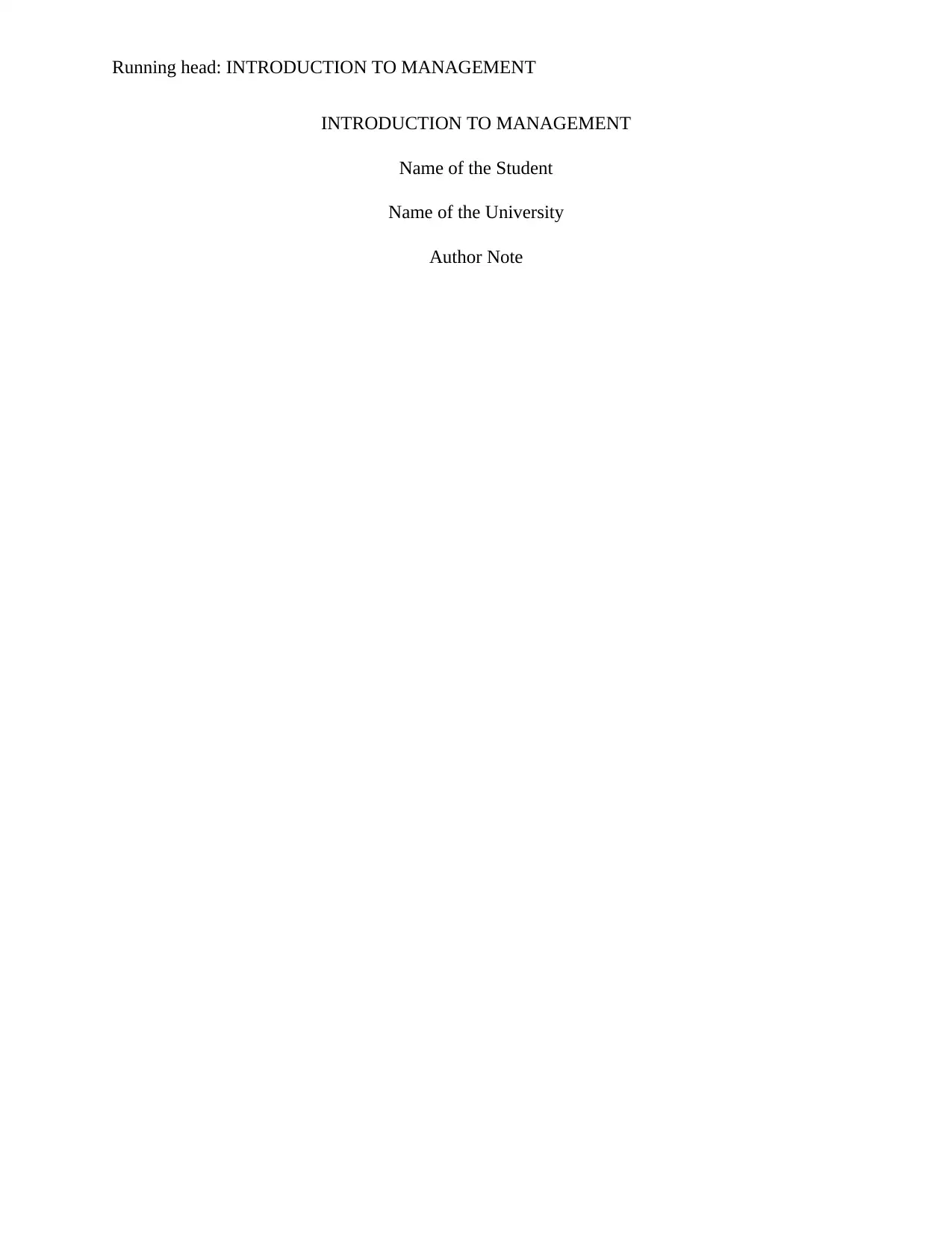
Running head: INTRODUCTION TO MANAGEMENT
INTRODUCTION TO MANAGEMENT
Name of the Student
Name of the University
Author Note
INTRODUCTION TO MANAGEMENT
Name of the Student
Name of the University
Author Note
Paraphrase This Document
Need a fresh take? Get an instant paraphrase of this document with our AI Paraphraser
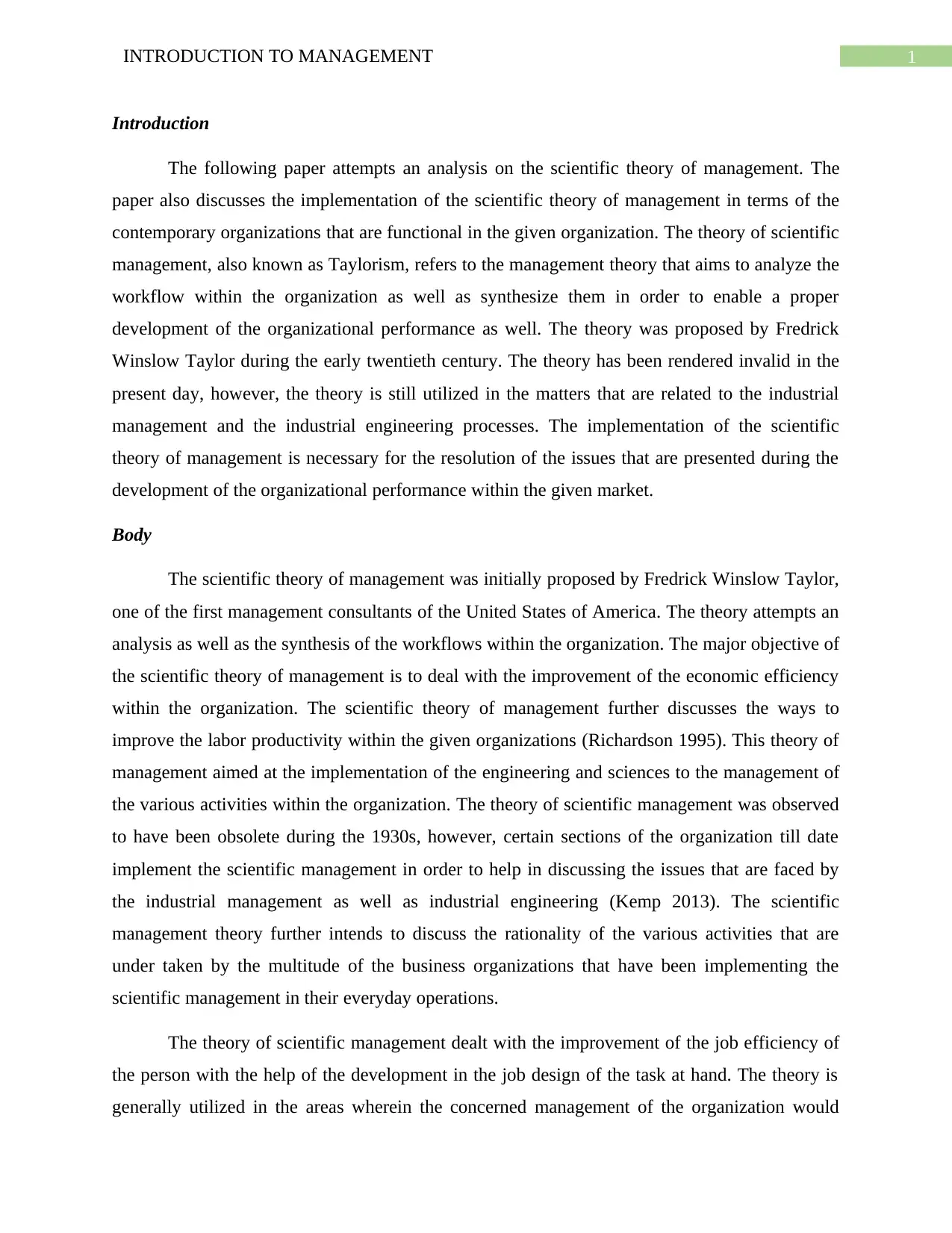
1INTRODUCTION TO MANAGEMENT
Introduction
The following paper attempts an analysis on the scientific theory of management. The
paper also discusses the implementation of the scientific theory of management in terms of the
contemporary organizations that are functional in the given organization. The theory of scientific
management, also known as Taylorism, refers to the management theory that aims to analyze the
workflow within the organization as well as synthesize them in order to enable a proper
development of the organizational performance as well. The theory was proposed by Fredrick
Winslow Taylor during the early twentieth century. The theory has been rendered invalid in the
present day, however, the theory is still utilized in the matters that are related to the industrial
management and the industrial engineering processes. The implementation of the scientific
theory of management is necessary for the resolution of the issues that are presented during the
development of the organizational performance within the given market.
Body
The scientific theory of management was initially proposed by Fredrick Winslow Taylor,
one of the first management consultants of the United States of America. The theory attempts an
analysis as well as the synthesis of the workflows within the organization. The major objective of
the scientific theory of management is to deal with the improvement of the economic efficiency
within the organization. The scientific theory of management further discusses the ways to
improve the labor productivity within the given organizations (Richardson 1995). This theory of
management aimed at the implementation of the engineering and sciences to the management of
the various activities within the organization. The theory of scientific management was observed
to have been obsolete during the 1930s, however, certain sections of the organization till date
implement the scientific management in order to help in discussing the issues that are faced by
the industrial management as well as industrial engineering (Kemp 2013). The scientific
management theory further intends to discuss the rationality of the various activities that are
under taken by the multitude of the business organizations that have been implementing the
scientific management in their everyday operations.
The theory of scientific management dealt with the improvement of the job efficiency of
the person with the help of the development in the job design of the task at hand. The theory is
generally utilized in the areas wherein the concerned management of the organization would
Introduction
The following paper attempts an analysis on the scientific theory of management. The
paper also discusses the implementation of the scientific theory of management in terms of the
contemporary organizations that are functional in the given organization. The theory of scientific
management, also known as Taylorism, refers to the management theory that aims to analyze the
workflow within the organization as well as synthesize them in order to enable a proper
development of the organizational performance as well. The theory was proposed by Fredrick
Winslow Taylor during the early twentieth century. The theory has been rendered invalid in the
present day, however, the theory is still utilized in the matters that are related to the industrial
management and the industrial engineering processes. The implementation of the scientific
theory of management is necessary for the resolution of the issues that are presented during the
development of the organizational performance within the given market.
Body
The scientific theory of management was initially proposed by Fredrick Winslow Taylor,
one of the first management consultants of the United States of America. The theory attempts an
analysis as well as the synthesis of the workflows within the organization. The major objective of
the scientific theory of management is to deal with the improvement of the economic efficiency
within the organization. The scientific theory of management further discusses the ways to
improve the labor productivity within the given organizations (Richardson 1995). This theory of
management aimed at the implementation of the engineering and sciences to the management of
the various activities within the organization. The theory of scientific management was observed
to have been obsolete during the 1930s, however, certain sections of the organization till date
implement the scientific management in order to help in discussing the issues that are faced by
the industrial management as well as industrial engineering (Kemp 2013). The scientific
management theory further intends to discuss the rationality of the various activities that are
under taken by the multitude of the business organizations that have been implementing the
scientific management in their everyday operations.
The theory of scientific management dealt with the improvement of the job efficiency of
the person with the help of the development in the job design of the task at hand. The theory is
generally utilized in the areas wherein the concerned management of the organization would
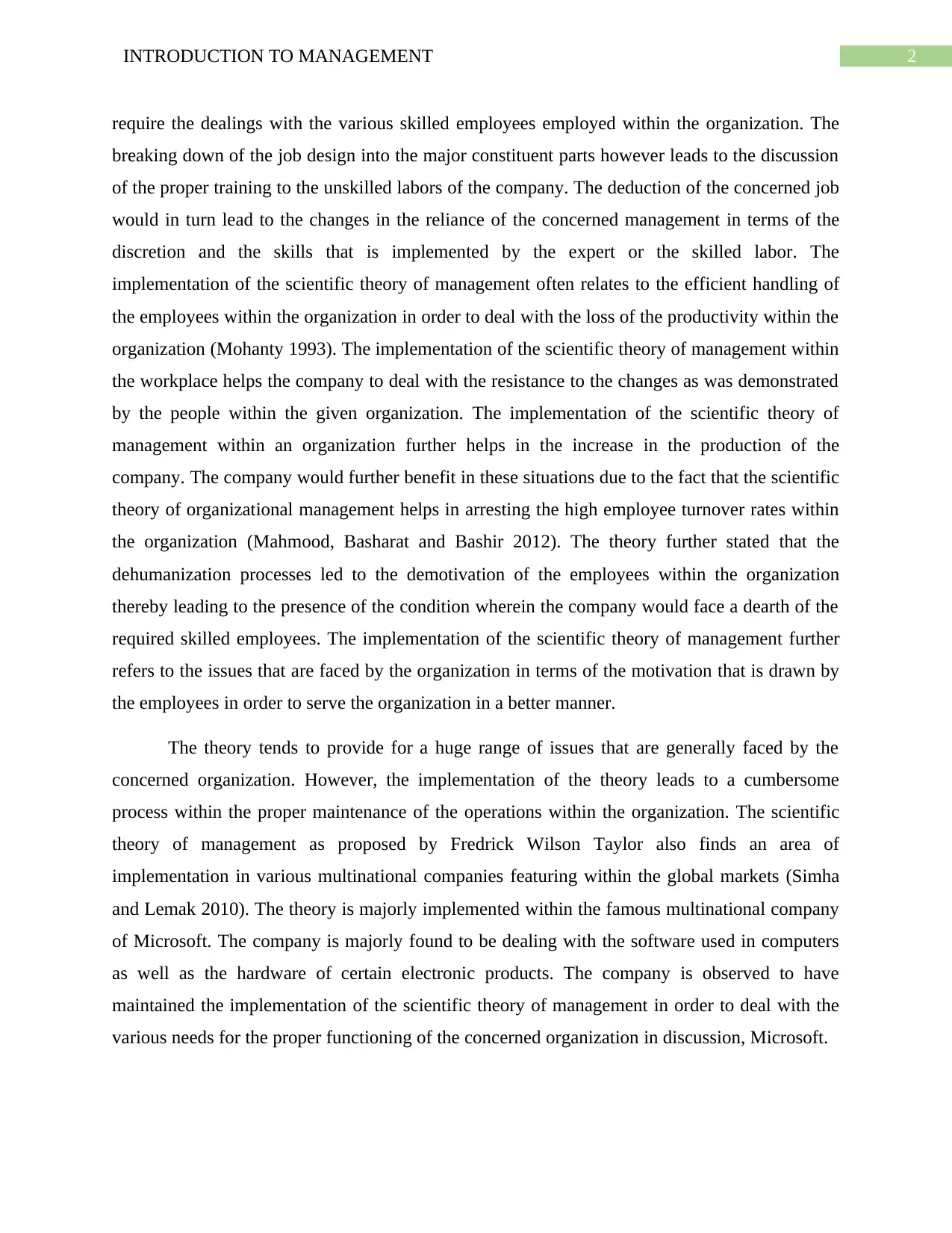
2INTRODUCTION TO MANAGEMENT
require the dealings with the various skilled employees employed within the organization. The
breaking down of the job design into the major constituent parts however leads to the discussion
of the proper training to the unskilled labors of the company. The deduction of the concerned job
would in turn lead to the changes in the reliance of the concerned management in terms of the
discretion and the skills that is implemented by the expert or the skilled labor. The
implementation of the scientific theory of management often relates to the efficient handling of
the employees within the organization in order to deal with the loss of the productivity within the
organization (Mohanty 1993). The implementation of the scientific theory of management within
the workplace helps the company to deal with the resistance to the changes as was demonstrated
by the people within the given organization. The implementation of the scientific theory of
management within an organization further helps in the increase in the production of the
company. The company would further benefit in these situations due to the fact that the scientific
theory of organizational management helps in arresting the high employee turnover rates within
the organization (Mahmood, Basharat and Bashir 2012). The theory further stated that the
dehumanization processes led to the demotivation of the employees within the organization
thereby leading to the presence of the condition wherein the company would face a dearth of the
required skilled employees. The implementation of the scientific theory of management further
refers to the issues that are faced by the organization in terms of the motivation that is drawn by
the employees in order to serve the organization in a better manner.
The theory tends to provide for a huge range of issues that are generally faced by the
concerned organization. However, the implementation of the theory leads to a cumbersome
process within the proper maintenance of the operations within the organization. The scientific
theory of management as proposed by Fredrick Wilson Taylor also finds an area of
implementation in various multinational companies featuring within the global markets (Simha
and Lemak 2010). The theory is majorly implemented within the famous multinational company
of Microsoft. The company is majorly found to be dealing with the software used in computers
as well as the hardware of certain electronic products. The company is observed to have
maintained the implementation of the scientific theory of management in order to deal with the
various needs for the proper functioning of the concerned organization in discussion, Microsoft.
require the dealings with the various skilled employees employed within the organization. The
breaking down of the job design into the major constituent parts however leads to the discussion
of the proper training to the unskilled labors of the company. The deduction of the concerned job
would in turn lead to the changes in the reliance of the concerned management in terms of the
discretion and the skills that is implemented by the expert or the skilled labor. The
implementation of the scientific theory of management often relates to the efficient handling of
the employees within the organization in order to deal with the loss of the productivity within the
organization (Mohanty 1993). The implementation of the scientific theory of management within
the workplace helps the company to deal with the resistance to the changes as was demonstrated
by the people within the given organization. The implementation of the scientific theory of
management within an organization further helps in the increase in the production of the
company. The company would further benefit in these situations due to the fact that the scientific
theory of organizational management helps in arresting the high employee turnover rates within
the organization (Mahmood, Basharat and Bashir 2012). The theory further stated that the
dehumanization processes led to the demotivation of the employees within the organization
thereby leading to the presence of the condition wherein the company would face a dearth of the
required skilled employees. The implementation of the scientific theory of management further
refers to the issues that are faced by the organization in terms of the motivation that is drawn by
the employees in order to serve the organization in a better manner.
The theory tends to provide for a huge range of issues that are generally faced by the
concerned organization. However, the implementation of the theory leads to a cumbersome
process within the proper maintenance of the operations within the organization. The scientific
theory of management as proposed by Fredrick Wilson Taylor also finds an area of
implementation in various multinational companies featuring within the global markets (Simha
and Lemak 2010). The theory is majorly implemented within the famous multinational company
of Microsoft. The company is majorly found to be dealing with the software used in computers
as well as the hardware of certain electronic products. The company is observed to have
maintained the implementation of the scientific theory of management in order to deal with the
various needs for the proper functioning of the concerned organization in discussion, Microsoft.
⊘ This is a preview!⊘
Do you want full access?
Subscribe today to unlock all pages.

Trusted by 1+ million students worldwide
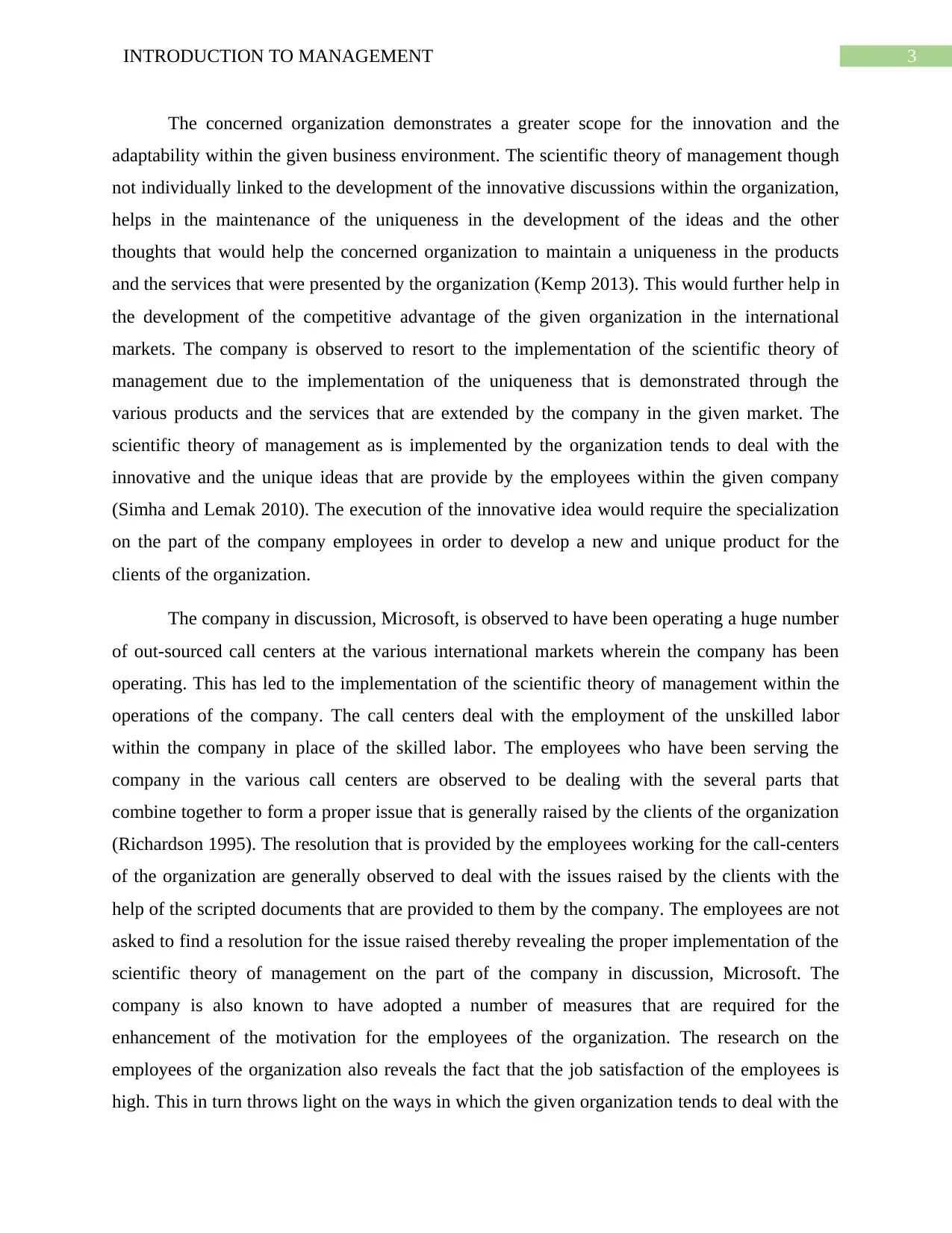
3INTRODUCTION TO MANAGEMENT
The concerned organization demonstrates a greater scope for the innovation and the
adaptability within the given business environment. The scientific theory of management though
not individually linked to the development of the innovative discussions within the organization,
helps in the maintenance of the uniqueness in the development of the ideas and the other
thoughts that would help the concerned organization to maintain a uniqueness in the products
and the services that were presented by the organization (Kemp 2013). This would further help in
the development of the competitive advantage of the given organization in the international
markets. The company is observed to resort to the implementation of the scientific theory of
management due to the implementation of the uniqueness that is demonstrated through the
various products and the services that are extended by the company in the given market. The
scientific theory of management as is implemented by the organization tends to deal with the
innovative and the unique ideas that are provide by the employees within the given company
(Simha and Lemak 2010). The execution of the innovative idea would require the specialization
on the part of the company employees in order to develop a new and unique product for the
clients of the organization.
The company in discussion, Microsoft, is observed to have been operating a huge number
of out-sourced call centers at the various international markets wherein the company has been
operating. This has led to the implementation of the scientific theory of management within the
operations of the company. The call centers deal with the employment of the unskilled labor
within the company in place of the skilled labor. The employees who have been serving the
company in the various call centers are observed to be dealing with the several parts that
combine together to form a proper issue that is generally raised by the clients of the organization
(Richardson 1995). The resolution that is provided by the employees working for the call-centers
of the organization are generally observed to deal with the issues raised by the clients with the
help of the scripted documents that are provided to them by the company. The employees are not
asked to find a resolution for the issue raised thereby revealing the proper implementation of the
scientific theory of management on the part of the company in discussion, Microsoft. The
company is also known to have adopted a number of measures that are required for the
enhancement of the motivation for the employees of the organization. The research on the
employees of the organization also reveals the fact that the job satisfaction of the employees is
high. This in turn throws light on the ways in which the given organization tends to deal with the
The concerned organization demonstrates a greater scope for the innovation and the
adaptability within the given business environment. The scientific theory of management though
not individually linked to the development of the innovative discussions within the organization,
helps in the maintenance of the uniqueness in the development of the ideas and the other
thoughts that would help the concerned organization to maintain a uniqueness in the products
and the services that were presented by the organization (Kemp 2013). This would further help in
the development of the competitive advantage of the given organization in the international
markets. The company is observed to resort to the implementation of the scientific theory of
management due to the implementation of the uniqueness that is demonstrated through the
various products and the services that are extended by the company in the given market. The
scientific theory of management as is implemented by the organization tends to deal with the
innovative and the unique ideas that are provide by the employees within the given company
(Simha and Lemak 2010). The execution of the innovative idea would require the specialization
on the part of the company employees in order to develop a new and unique product for the
clients of the organization.
The company in discussion, Microsoft, is observed to have been operating a huge number
of out-sourced call centers at the various international markets wherein the company has been
operating. This has led to the implementation of the scientific theory of management within the
operations of the company. The call centers deal with the employment of the unskilled labor
within the company in place of the skilled labor. The employees who have been serving the
company in the various call centers are observed to be dealing with the several parts that
combine together to form a proper issue that is generally raised by the clients of the organization
(Richardson 1995). The resolution that is provided by the employees working for the call-centers
of the organization are generally observed to deal with the issues raised by the clients with the
help of the scripted documents that are provided to them by the company. The employees are not
asked to find a resolution for the issue raised thereby revealing the proper implementation of the
scientific theory of management on the part of the company in discussion, Microsoft. The
company is also known to have adopted a number of measures that are required for the
enhancement of the motivation for the employees of the organization. The research on the
employees of the organization also reveals the fact that the job satisfaction of the employees is
high. This in turn throws light on the ways in which the given organization tends to deal with the
Paraphrase This Document
Need a fresh take? Get an instant paraphrase of this document with our AI Paraphraser
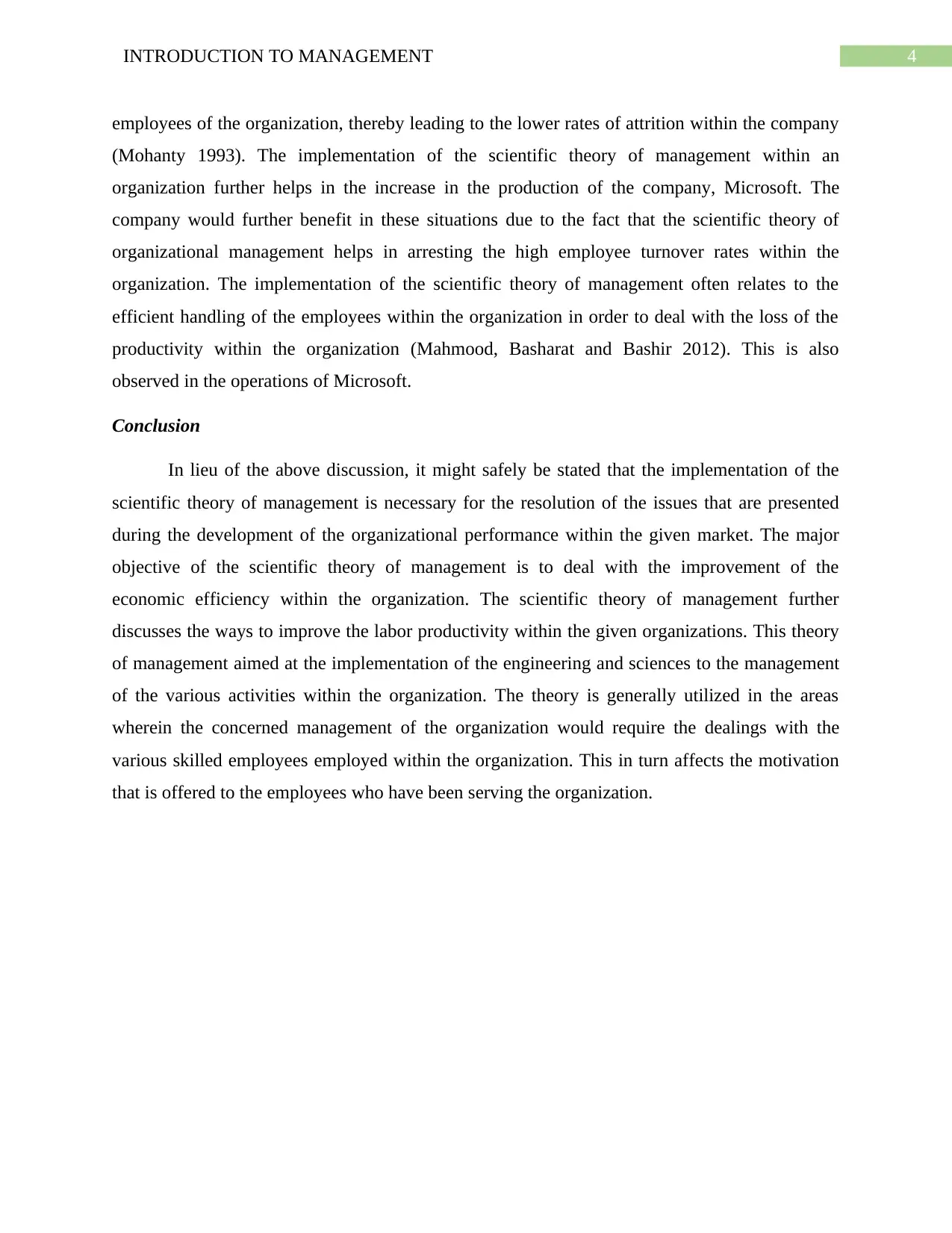
4INTRODUCTION TO MANAGEMENT
employees of the organization, thereby leading to the lower rates of attrition within the company
(Mohanty 1993). The implementation of the scientific theory of management within an
organization further helps in the increase in the production of the company, Microsoft. The
company would further benefit in these situations due to the fact that the scientific theory of
organizational management helps in arresting the high employee turnover rates within the
organization. The implementation of the scientific theory of management often relates to the
efficient handling of the employees within the organization in order to deal with the loss of the
productivity within the organization (Mahmood, Basharat and Bashir 2012). This is also
observed in the operations of Microsoft.
Conclusion
In lieu of the above discussion, it might safely be stated that the implementation of the
scientific theory of management is necessary for the resolution of the issues that are presented
during the development of the organizational performance within the given market. The major
objective of the scientific theory of management is to deal with the improvement of the
economic efficiency within the organization. The scientific theory of management further
discusses the ways to improve the labor productivity within the given organizations. This theory
of management aimed at the implementation of the engineering and sciences to the management
of the various activities within the organization. The theory is generally utilized in the areas
wherein the concerned management of the organization would require the dealings with the
various skilled employees employed within the organization. This in turn affects the motivation
that is offered to the employees who have been serving the organization.
employees of the organization, thereby leading to the lower rates of attrition within the company
(Mohanty 1993). The implementation of the scientific theory of management within an
organization further helps in the increase in the production of the company, Microsoft. The
company would further benefit in these situations due to the fact that the scientific theory of
organizational management helps in arresting the high employee turnover rates within the
organization. The implementation of the scientific theory of management often relates to the
efficient handling of the employees within the organization in order to deal with the loss of the
productivity within the organization (Mahmood, Basharat and Bashir 2012). This is also
observed in the operations of Microsoft.
Conclusion
In lieu of the above discussion, it might safely be stated that the implementation of the
scientific theory of management is necessary for the resolution of the issues that are presented
during the development of the organizational performance within the given market. The major
objective of the scientific theory of management is to deal with the improvement of the
economic efficiency within the organization. The scientific theory of management further
discusses the ways to improve the labor productivity within the given organizations. This theory
of management aimed at the implementation of the engineering and sciences to the management
of the various activities within the organization. The theory is generally utilized in the areas
wherein the concerned management of the organization would require the dealings with the
various skilled employees employed within the organization. This in turn affects the motivation
that is offered to the employees who have been serving the organization.
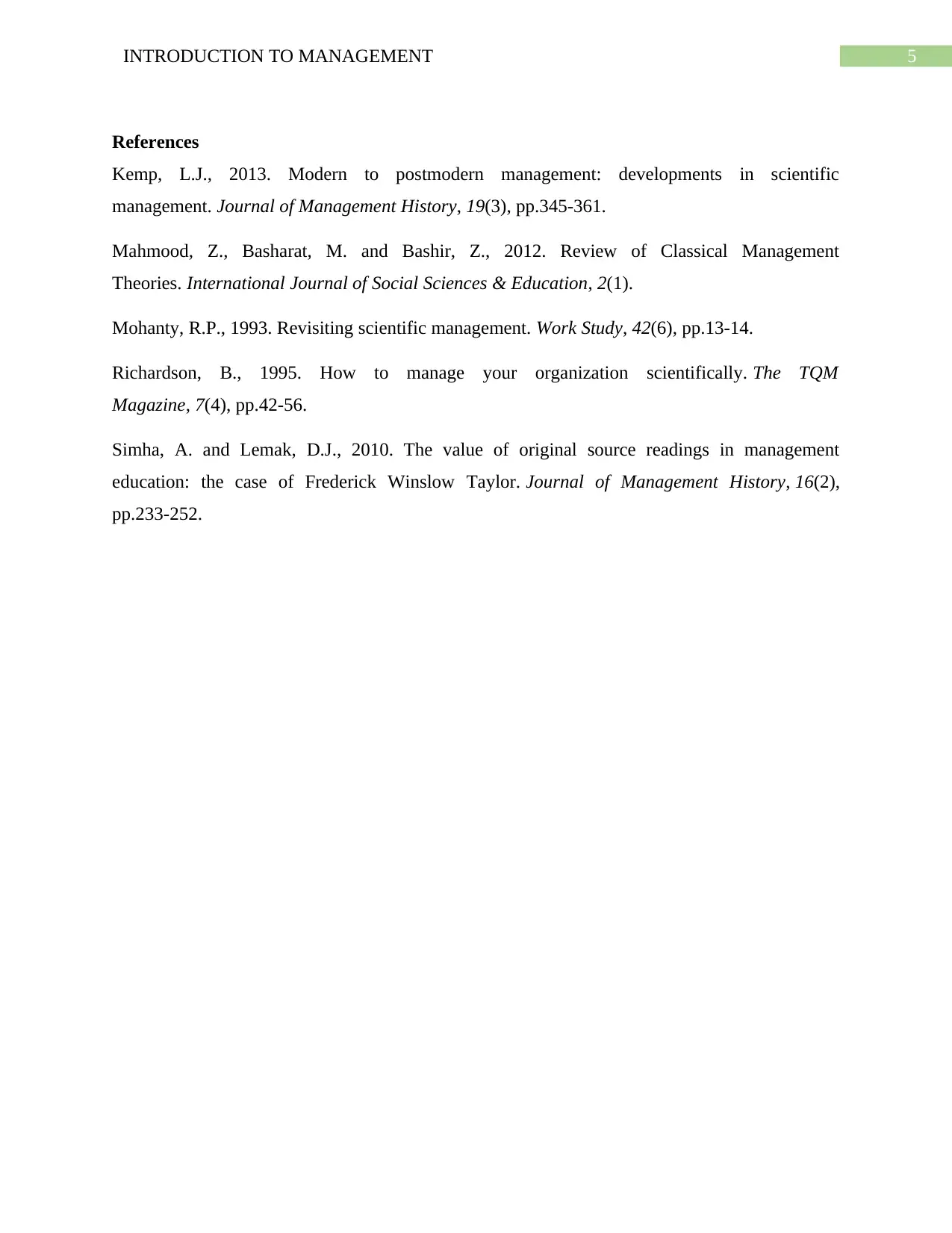
5INTRODUCTION TO MANAGEMENT
References
Kemp, L.J., 2013. Modern to postmodern management: developments in scientific
management. Journal of Management History, 19(3), pp.345-361.
Mahmood, Z., Basharat, M. and Bashir, Z., 2012. Review of Classical Management
Theories. International Journal of Social Sciences & Education, 2(1).
Mohanty, R.P., 1993. Revisiting scientific management. Work Study, 42(6), pp.13-14.
Richardson, B., 1995. How to manage your organization scientifically. The TQM
Magazine, 7(4), pp.42-56.
Simha, A. and Lemak, D.J., 2010. The value of original source readings in management
education: the case of Frederick Winslow Taylor. Journal of Management History, 16(2),
pp.233-252.
References
Kemp, L.J., 2013. Modern to postmodern management: developments in scientific
management. Journal of Management History, 19(3), pp.345-361.
Mahmood, Z., Basharat, M. and Bashir, Z., 2012. Review of Classical Management
Theories. International Journal of Social Sciences & Education, 2(1).
Mohanty, R.P., 1993. Revisiting scientific management. Work Study, 42(6), pp.13-14.
Richardson, B., 1995. How to manage your organization scientifically. The TQM
Magazine, 7(4), pp.42-56.
Simha, A. and Lemak, D.J., 2010. The value of original source readings in management
education: the case of Frederick Winslow Taylor. Journal of Management History, 16(2),
pp.233-252.
⊘ This is a preview!⊘
Do you want full access?
Subscribe today to unlock all pages.

Trusted by 1+ million students worldwide
1 out of 6
Related Documents
Your All-in-One AI-Powered Toolkit for Academic Success.
+13062052269
info@desklib.com
Available 24*7 on WhatsApp / Email
![[object Object]](/_next/static/media/star-bottom.7253800d.svg)
Unlock your academic potential
Copyright © 2020–2026 A2Z Services. All Rights Reserved. Developed and managed by ZUCOL.





